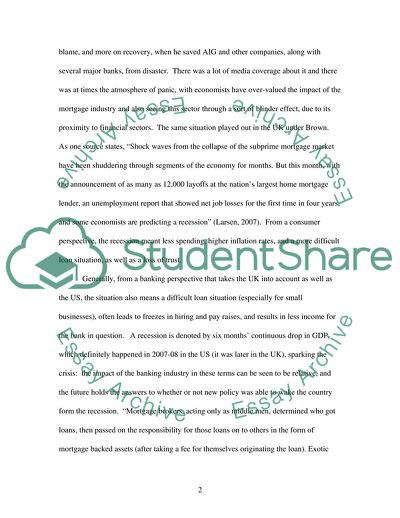Cite this document
(The Causes of the Economic Financial Crisis of 2008 Coursework, n.d.)
The Causes of the Economic Financial Crisis of 2008 Coursework. https://studentshare.org/macro-microeconomics/1737268-what-case-can-be-made-that-it-was-the-lack-of-regulation-of-the-banking-sector-that-led-to-the-financial-crisis-of-2008-9-what-are-the-new-regulatory-structures-that-are-being-proposed-in-the-us-and-uk
The Causes of the Economic Financial Crisis of 2008 Coursework. https://studentshare.org/macro-microeconomics/1737268-what-case-can-be-made-that-it-was-the-lack-of-regulation-of-the-banking-sector-that-led-to-the-financial-crisis-of-2008-9-what-are-the-new-regulatory-structures-that-are-being-proposed-in-the-us-and-uk
(The Causes of the Economic Financial Crisis of 2008 Coursework)
The Causes of the Economic Financial Crisis of 2008 Coursework. https://studentshare.org/macro-microeconomics/1737268-what-case-can-be-made-that-it-was-the-lack-of-regulation-of-the-banking-sector-that-led-to-the-financial-crisis-of-2008-9-what-are-the-new-regulatory-structures-that-are-being-proposed-in-the-us-and-uk.
The Causes of the Economic Financial Crisis of 2008 Coursework. https://studentshare.org/macro-microeconomics/1737268-what-case-can-be-made-that-it-was-the-lack-of-regulation-of-the-banking-sector-that-led-to-the-financial-crisis-of-2008-9-what-are-the-new-regulatory-structures-that-are-being-proposed-in-the-us-and-uk.
“The Causes of the Economic Financial Crisis of 2008 Coursework”. https://studentshare.org/macro-microeconomics/1737268-what-case-can-be-made-that-it-was-the-lack-of-regulation-of-the-banking-sector-that-led-to-the-financial-crisis-of-2008-9-what-are-the-new-regulatory-structures-that-are-being-proposed-in-the-us-and-uk.


